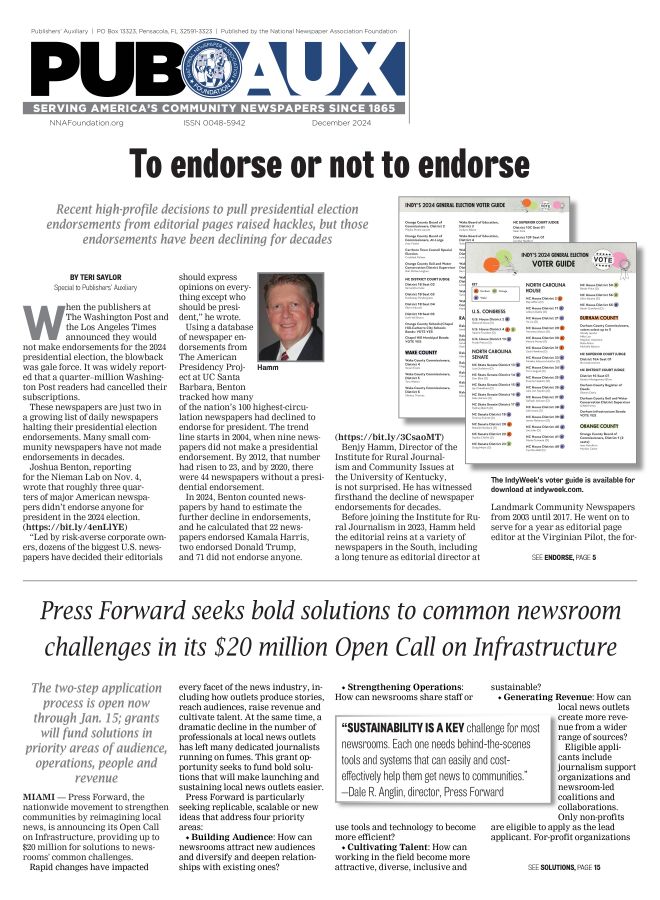True effect of big campaign spending unclear
Nov 8, 2012
FOR IMMEDIATE RELEASE – PUBLISHABLE ANYTIME – 11/8 THROUGH 15, 2012
Inside the First Amendment
By Gene Policinski
First Amendment Center
WASHINGTON – There’s one result from the election that we likely won’t know for months or even years: the full meaning of this year’s massive run-up in campaign spending.
The U.S. Supreme Court, in its Citizens United v. Federal Election Commission decision in 2010, freed corporations, unions and others to spend as much on elections as they wish – setting up the circumstances for the financial version of Superstorm Sandy in this year’s races.
The Court voted 5-4 that limits on corporate spending violated First Amendment political free-speech rights. Justice Anthony Kennedy, writing for the majority, said there was “no basis for the proposition that, in the context of political speech, the Government may impose restrictions on certain disfavored speakers.”
The decision was attacked immediately by a variety of public-interest groups that advocate changing how campaigns are financed. And just days after the ruling – with several justices sitting in front of him – President Obama used his State of the Union address to call for bipartisan congressional action to roll back the decision.
“Last week,” Obama said, “The Supreme Court reversed a century of law to open the floodgates for special interests … to spend without limit in our elections. Well, I don’t think American elections should be bankrolled by America’s most powerful interests.”
No legislation made it to Obama’s desk, but the “open floodgate” forecast proved accurate.
An Oct. 31 report in the Huffington Post said that in 2008, the Obama and McCain campaigns spent more than $1 billion. This year, the posting said, expenditures by the two major campaigns “have already sailed past the $2 billion mark.”
The day before the Nov. 6 election, National Public Radio said a report by the Center for Responsive Politics “places the total cost of the 2012 elections at an estimated $6 billion, which would make it the most expensive election in U.S. history.”
Two days after the voting, The New York Times opined that although the outpouring of cash reshaped the GOP nomination race, and shored up some Republican incumbents, “the prize most sought by the emerging class of mega-donors remained outside their grasp.”
And the Huffington Post noted Nov. 7 an outcome from Citizens United that had not gotten much attention: “Organized labor's larger contribution this election may have been its outreach to non-union voters, something that wasn't possible until the legal changes” resulting from the ruling. Union volunteers now were free to “knock on the doors of non-members for the first time, vastly expanding organized labor's canvassing and get-out-the-vote operations,” the report said.
A major question looking ahead is whether or not so-called mega-donors will be willing in upcoming races to spend such massive sums that may well have canceled each other out or proved ineffective.
Linda McMahon, a former pro-wrestling executive, reportedly has spent nearly $100 million of her own funds in twice failing to win a U.S. Senate seat in Connecticut. Casino magnate Sheldon Adelson spent “tens of millions” of dollars in support of eight candidates, through contributions to political action committees, The New York Times reported. None of the eight was elected on Nov. 6.
The ongoing national discussion about balancing First Amendment concerns against worries about the supposed negative influence of massive spending and contributions will include:
- Lawmakers revisiting the century-old idea of corporations as “persons” having various legal rights including freedom of speech, with ramifications beyond campaign spending, possibly even into criminal law.
- Accurately assessing whether the uptick in spending in state and federal elections really altered outcomes, particularly in the final stages of campaigns where it might have provided one candidate with a late advantage.
- Transparency in identifying donors that could undermine the long-held right to anonymous speech, which stretches back to the nation’s founding.
- An Obama administration decision about continuing to support moves to reverse Citizens United given the apparent benefit of new levels of support by groups such as unions that typically favor Democrats.
Finding the right speech-spending balance also pits two core principles against each other: full exercise of Americans’ protected right to speak loudly on politics and public issues, vs. negating the corrupting influence in elections and government policy that may accompany the presence of “big money.”
The results are still out on all of those 2012 election-night questions.
Gene Policinski is senior vice president and executive director of the First Amendment Center, 1207 18th Ave. S., Nashville, Tenn., 37212. Web: www.firstamendmentcenter.org. E-mail: gpolicinski@fac.org.







